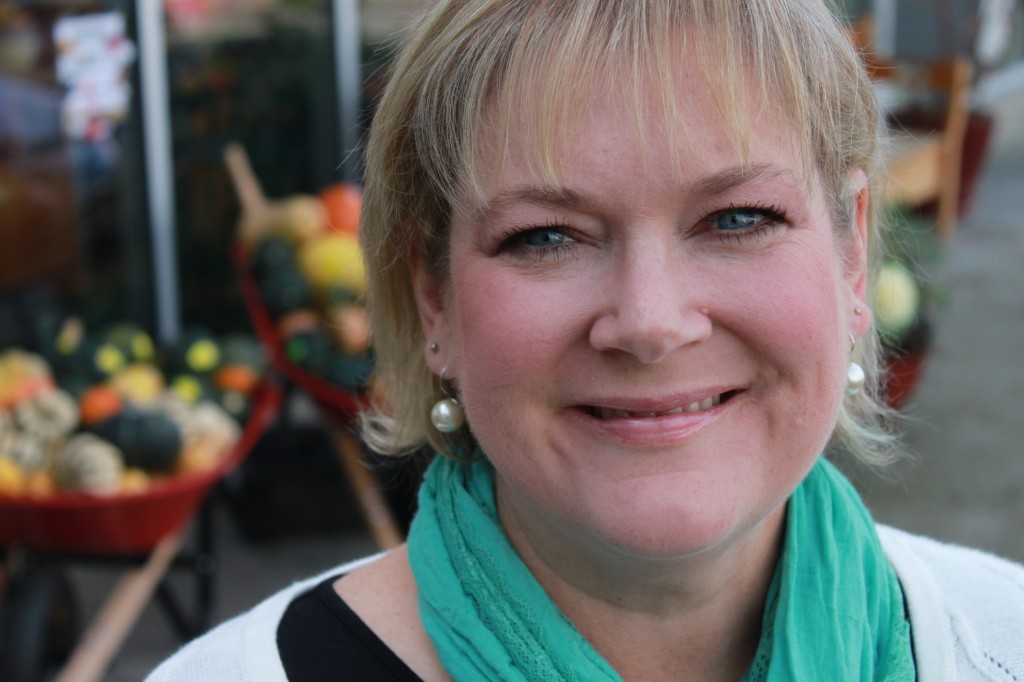Q: What is your food philosophy (what do you enjoy eating and feel is healthy)?
A: In our house we focus on “real food”. To us this means food that is as fresh and local as possible, mostly organically-grown or raised in a way that nature intended, homemade and minimally processed. This means I prepare a LOT of food in my own kitchen. We also try to minimize our consumption of grain-based carbohydrates and one member of our family has a recently-discovered wheat allergy so we try to avoid that altogether. The goal is, every meal entirely from scratch including sauces, condiments and salad dressings. We don’t achieve this 100% of the time, but we do most of the time.
Q: Why do you shop at the Co-op?
A: I shop at the Co-op because it is a convenient place to find many of the organic or specialty products that I love while supporting a local business. I also believe that every food dollar we spend is a vote in support of what kind of food we want to eat and the practices that are used in bringing these foods to our dinner table. The less we spend at large, corporate grocery stores that oppose GMO labeling and use practices that overtly deceive consumers, and the more we spend at locally owned stores like the Co-op that provide quality products from quality farms, dairies and other companies, then the quicker we will see a shift in our overall food supply. This is a shift that I believe is happening, which I think is exciting.
Q: What is your favorite product(s)?
A: Many of my favorite products at the Co-op are in the bulk section. I love the selection of nuts, seeds and alternative flours. I also love the selection of farmstead cheeses and other dairy products. And of course, I buy many of the herbal
supplements and natural remedies. My husband is especially impressed with the beer selection.
Q: How do you encourage your children to eat healthy?
A: My kids are older now and are able to understand how food affects them and why good nutrition and “clean eating” are important. I share articles with them that I read on certain subjects so they can have the information themselves.
When they ask for things I’d rather they not have I’ll ask them to read the ingredients. Learning what many of these hard-to-pronounce ingredients are, is often enough to help them decide on their own to make a better choice. My kids often hear me say “This isn’t food”.
I also really try to help my children understand how the food they have eaten may be making them feel at a certain time. About 8 years ago I stopped buying anything with artificial color and immediately noticed a change in their behavior. It was drastic! Now they are older and though eating colorful candy is still tempting to them and they occasionally do, they all realize that it doesn’t help them feel and think better, later.
Q: “What are your favorite foods around the holidays?”
A: We celebrate Christmas at our house and that starts soon after Thanksgiving. Normally we don’t do too many sweet treats, but at Christmas we splurge a little. Each of the kids gets to help make their favorite treat, and we share with friends and neighbors and enjoy them through the season. Our big Christmas dinner usually consists of a prime rib roast with all the usual side dishes. This will be the second year it will come from locally raised, grass fed beef. And in keeping with my mother’s tradition, who felt like Christmas was her only day off throughout the year, we have our big dinner on Christmas Eve. It’s all homemade from scratch, and the whole family is involved! Walt roasts the prime rib, my daughters make pies, my son makes fluffy dinner rolls and I take care of the sides. Christmas morning is a cheese and egg breakfast casserole with homemade cinnamon rolls. Both have been made ahead so all we have to do it pop them in the oven. The rest of the day we snack on the most delicious reheated leftovers, and things like dips, cheese spreads and cold salads that have been made ahead so that we have more time to enjoy the day without spending it working in the kitchen.
Q: What advice would you give to another family who is just starting to focus on feeding their family healthier, less processed food?
A: My advice would be baby steps. It can be very overwhelming at first. Try to focus on any improvement you make and not on how much is left to be learned or accomplished. If most of your meals are processed or packaged, then begin by trying to cook 2 nights a week. Try to make extra to put in the freezer for a future meal. Get the whole family involved. Watch cooking shows or You Tube videos to learn techniques or new recipes. And don’t be afraid to experiment a little! And then after 6 months or so look back at what you were doing when you started and see how far you’ve come. You’ll probably impress yourself!
See Marni’s recipe for Spaghetti Squash Au Gratin in our winter newsletter (out soon).
